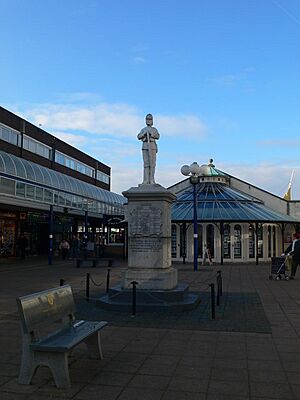Boer War Memorial, Winsford facts for kids
The Boer War Memorial is a special statue found in the shopping area of Winsford, Cheshire, England. It shows a soldier in uniform standing on a tall base. This memorial was first shown to the public in 1906. It used to be in a different part of Winsford but was moved to its current spot in the 1960s. The memorial not only lists the names of soldiers who died in the Boer Wars but also includes the names of those who survived.
Contents
History of the Memorial
After the Boer Wars ended, a group of people decided to create a memorial. They wanted to remember the soldiers from Winsford. They raised £125 by collecting money from about 700 people, going door-to-door.
The statue was made by a sculptor named Herbert Chatham. The building work was done by G. Hamlett and Sons. The memorial was officially shown to the public on October 24, 1906. General Ridley, who had fought in the war, was there to unveil it. The memorial was first placed next to the Brunner Guildhall on High Street. Later, in the 1960s, it was moved to the shopping area where it stands today.
What the Memorial Looks Like
The memorial has a white marble statue of a soldier. This soldier stands on a pedestal made of granite from Scotland. The soldier statue is about 144 centimeters (about 4 feet 9 inches) tall. The pedestal it stands on is about 230 centimeters (about 7 feet 6 inches) tall.
The memorial is in a paved area. It is surrounded by a chain fence. At the bottom, there are two steps. On these steps, there is a square base and then the tall pedestal. On top of the pedestal is the soldier. He is wearing the uniform from the Boer Wars. The soldier stands in a relaxed pose, holding a rifle. He also has a satchel, a water flask, strips of bullets, and a small bag on his hip. A dagger is on his belt.
Messages on the Memorial
The memorial has several important messages carved into it.
On the side facing the shopping area, it says:
- ERECTED BY PUBLIC SUBSCRIPTION
- 1906
This means the public paid for it in 1906.
On a special scroll design on the same side, there is a Latin phrase:
- DULCE ET
- DECORUM EST PRO
- PATRIA MORI
This Latin phrase means "It is sweet and proper to die for one's country."
Below this scroll, a cartouche (a fancy carved shape) lists:
- WINSFORD MEN WHO DIED WHILE SERVING
- IN THE SOUTH AFRICAN CAMPAIGN
- 1899–1902
After this, there is a list of names of the soldiers from Winsford who died.
Underneath that, it says:
- THIS MEMORIAL WAS UNVEILED BY
- GENERAL RIDLEY C.B.
- ON THE 24TH DAY OF NOVEMBER 1906
- ARTHUR HAMLETT, CHAIRMAN
- JNO. H. COOKE, CLERK
- WINSFORD
- URBAN
- DISTRICT
- COUNCIL
This tells us who unveiled the memorial and who was in charge of the Winsford Urban District Council at that time.
On the north side of the memorial's base, it lists:
- WINSFORD MEN WHO SERVED AS VOLUNTEERS
- AND SURVIVED
This is followed by the names of volunteers who fought and came home safely.
On the south side of the memorial's base, it says:
- WINSFORD MEN WHO SERVED IN THE REGULAR ARMY
- AND SURVIVED
This section lists the names of soldiers from the regular army who survived the war.
Why the Memorial is Important
The Boer War Memorial is a very important historical site. It is officially listed as a Grade II listed building in the National Heritage List for England. It received this special status on March 12, 1986. Being a Grade II listed building means it is considered a "building of national importance and special interest." This helps protect it for future generations.


